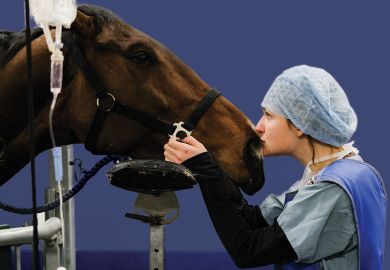Politicians and policymakers must be more ambitious for different kinds of universities across the UK rather than expecting they should all look like “a medieval theme park”, while the sector risks being “tone deaf” by lobbying for a rise in tuition fees, according to a leading vice-chancellor.
Sir Chris Husbands’ retirement from Sheffield Hallam University at the end of 2023 was recently confirmed after the appointment of his successor, University of Lincoln provost Liz Mossop.
That brings the imminent exit of one of the sector’s most influential leaders: closely engaged with higher education and schools policy at national level, a key voice on the civic role of universities, with a different set of life experiences from those of most vice-chancellors.
A former director of the UCL Institute of Education, since taking over at Hallam in 2016 Sir Chris has sought to cement its role in “serving the city, serving the region, connecting the city and the region to the world; but fundamentally driving opportunity in, for, around South Yorkshire”, he told Times Higher Education.
Sheffield Hallam, which recruits about 40 per cent of its 30,000 students from within 25 miles of its campus, has under Sir Chris’ leadership launched South Yorkshire Futures, an effort to boost school pupils’ attainment and well-being by working with schools and four local authorities across a region hit hard by job losses in mining and steel over recent decades.
Is what universities like Sheffield Hallam do sufficiently understood by politicians or the media?
“We have locked in our head a model of full-time, residential, undergraduate” higher education, plus “a sense that universities are separate from their communities – you see that when you look at the walls around Oxbridge colleges or the greenfield campuses of the 1960s”, said Sir Chris.
“The consequence of that,” he continued, “is that society as a whole, politicians and policymakers in particular, are insufficiently ambitious about what different sorts of universities could be. If you are not looking like a medieval theme park, then you are [judged as] in some way failing as an institution.
“If we are really going to build the talents of a diverse population of learners, we are going to need increasingly diverse delivery, increasingly diverse performance indicators, increasingly diverse institutions…I’m just a bit sad that we’re a bit more conservative than we were 20 years ago – 30 years ago, actually.”
Asked about scepticism of the value of higher education expansion from some on the right, Sir Chris defended the need for greater student numbers, but also said: “Let’s not talk about participation rates; let’s talk about delivery modes, let’s talk about what we as a country are going to need for the mid-21st-century economy. We need the future generations to…have a broader, flexible knowledge base that enables them to be sufficiently flexible as they move on. That’s something we know universities can do really well.
“They [universities] don’t just need to do it for a full-time, 18-year-old model – that is a consequence of funding…Let us think about what we can get out of the university system.”
Sir Chris lamented the collapse in part-time undergraduate education caused by the trebling of fees in England in 2012. And while he is an “enthusiast” for the government’s planned lifelong loan entitlement “in principle”, he is “yet to be persuaded that those people who did not progress to higher education at 18, because they didn’t have the grades, are going in later life to [be prepared to] build up debt in terms of acquiring additional skills”.
What does he think is the way forward on funding for English universities, where the freeze in tuition fees is eroding resources?
“Since I am heading for the exit, I will be a bit critical of the way the sector has positioned itself,” Sir Chris said.
“As long as the sector says ‘this is an issue of institutional sustainability, give us some more money’, it’s going to sound like ‘please give us more money to carry on doing what we are already doing’.
“As long as the argument is about ‘put the fees up from £9,250 to £11,000 or £12,000’, it’s a bit of a tone-deaf response,” he added, pointing out that for many students, living costs are as much as the sticker price on fees and the sector should not “focus on just one half of that”.
He went on: “And we’ve got to approach this differently to say, over the next 30, 40 years, what are universities for?…How much of that is private cost that needs to be met through loans…how much of that is a public gain that needs to be reflected [in public funding]?”
Sir Chris added: “The funding model we now have is non-sustainable. I’ve heard vice-chancellors tell me I shouldn’t say that; that any other model is going to be worse. But…an increase in fees on its own doesn’t actually solve anything.”
On Sheffield Hallam and South Yorkshire, he said that “the way I’ve always put it is we work on the supply and the demand side of the local economy”, working with schools, but also with local authorities and local businesses.
He highlighted developments such as Sheffield Hallam’s position as one of the country’s largest providers of degree apprenticeships and its Advanced Wellbeing Research Centre.
Sheffield is “not atypical – it’s like post-industrial cities around the world”, Sir Chris continued. “The choices are tough. There’s not a magic bullet; universities are an absolutely critical part of the mix. We cannot do this on our own…We have got to work with mayoral combined authorities, with local authorities, with local industry, to shape the future together.”
Sheffield’s position as a city hit by deindustrialisation connects with Sir Chris’ personal background.
He grew up in Nuneaton, near Coventry. His mother and father met while working in a weaving factory where his paternal grandfather also worked. “My dad worked in that factory for 28 years,” Sir Chris said. “He was made redundant when the industrial collapse of the 1970s hit; he was made redundant four more times between 1975 and 1983.”
Sir Chris, “the first person in my family to stay at school beyond the age of 14”, went to the University of Cambridge and completed a PhD in geography.
“The reason I tell that story is because all four of my kids went to my university,” he added. “This is the point about education: it flips the dial of expectations; it flips the dial of assumptions.”
After university, he “taught in urban comprehensive schools – that gave me a second, parallel education”, where he “learned loads of stuff from kids who had the same sorts of background as me” but who, “partly because of the consequences of that industrial decline…faced enormous challenges”.
Sir Chris later made the switch to being an academic working on teacher education. “I never believed I was a top-flight academic,” he said. “I thought I was much better at getting the best out of people and building teams and working with people.
“I’ve absolutely adored it,” he added of applying that as a university leader, describing himself as “really lucky” to have worked with people such as the late Lord Kerslake, who chaired Sheffield Hallam’s board of governors, Richard Calvert, a deputy vice-chancellor recruited from the Department for Education, and head of policy Natalie Day.
After retirement, Sir Chris said, he hoped he would “find people who think I’ve got something to contribute” on “the development of higher education” and “education policy more generally”, and on helping organisations “do policy better, do strategy better, get the best out of their people”.
john.morgan@timeshighereducation.com
Sector husbandry: Sir Chris’ career
- Graduated from University of Cambridge in history and completed PhD in geography
- Completed PGCE at Institute of Education, University of London and taught in secondary schools
- 1995-2003: reader and, from 1998, professor of education, and, from 2000, director of the Institute of Education, University of Warwick
- 2003-07: professor of research in education and head of School of Education and Lifelong Learning, University of East Anglia
- 2007-15: professor of higher education policy and, from 2011, director of the Institute of Education, University of London
- 2014: led Institute of Education into merger with UCL, becoming UCL Institute of Education
- 2014-15: vice-provost, UCL
- 2016-present: vice-chancellor, Sheffield Hallam University
- 2016-present: chair, Teaching Excellence Framework
Register to continue
Why register?
- Registration is free and only takes a moment
- Once registered, you can read 3 articles a month
- Sign up for our newsletter
Subscribe
Or subscribe for unlimited access to:
- Unlimited access to news, views, insights & reviews
- Digital editions
- Digital access to THE’s university and college rankings analysis
Already registered or a current subscriber?








